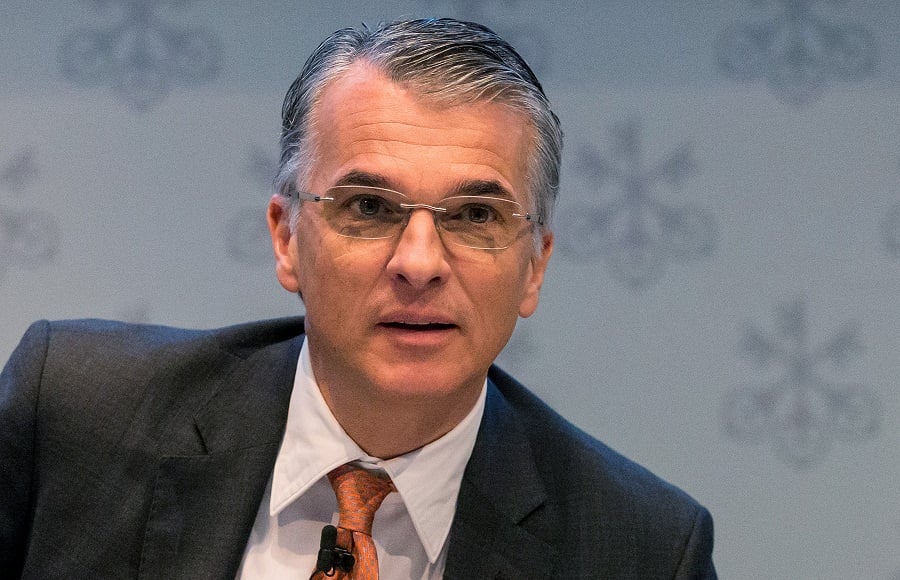

UBS Group is searching for a successor to Chief Executive Sergio Ermotti, making it the latest European bank to consider changes at the top in an industry beset by sluggish growth.
UBS is formally seeking internal and external candidates after Mr. Ermotti -- one of Europe’s longest-serving bank CEOs -- briefed executives on his plans to step down this year, people with knowledge of the matter said.
International wealth management co-head Iqbal Khan, a star hire who joined UBS in October from crosstown rival Credit Suisse Group, may not be among the front-runners to take the top role given his relatively brief tenure, the people said.
Mr. Ermotti, who has made private banking the centerpiece of UBS’s strategy, brought in Mr. Khan to execute the biggest revamp of the key wealth management unit in almost a decade. The lender, like many of its European peers, has dialed back its ambitions amid negative interest rates and muted client activity. Last month, Mr. Ermotti cut the bank’s targets for a second time in as many years against the backdrop of this outlook.
UBS has been seeking to quell questions about the bank’s long-term succession plan since the departure of former star executives including Andrea Orcel. Mr. Khan’s arrival at UBS and the elevation of other top executives had been seen as taking some pressure off Mr. Ermotti to show a strong bench of internal candidates.
The CEO, who is in his ninth year in the job, is part of a Europe-wide trend of bank executives getting ready to hand over the reins to the next generation. Lenders including Societe Generale and HSBC Holdings are among those also looking for replacements. Credit Suisse just replaced its CEO, though in the aftermath of a spying scandal.
A UBS spokesman said the bank declined to comment on succession.
Mr. Ermotti undertook a radical overhaul of the top ranks in August. After a year marred by huge legal fines, questions about succession and a deepening slump in share prices, he replaced wealth management co-head Martin Blessing with Mr. Khan, elevating Suni Harford to take over asset management and Sabine Keller-Busse as EMEA president.
The lender is weighing changes at the top of the organization after a major overhaul at its biggest competitor, crosstown Zurich rival Credit Suisse, following a spying scandal that tainted the bank and caused the ouster of CEO Tidjane Thiam. The executive was in charge for a tumultuous 4½ years, about half Mr. Ermotti’s tenure.
UBS chairman Axel Weber said last month that succession was not at the forefront of his concerns and that his top priority is working to reduce the $5 billion tax fine that’s prompted the bank to postpone a decision on future share buybacks until the second half. The bank received the fine after a Paris court found it guilty of helping wealthy French clients stash undeclared funds in Swiss accounts.
The topic of succession at the Swiss wealth manager was forced out into the open a year ago when Mr. Weber said in an interview that he and Mr. Ermotti were in their eighth year at the bank, “a point in time where you need to start thinking about what is it you’re going to do and how you’re going to pass the bank over to your successors.” That was interpreted by some as being a sign that he was starting considering who might replace Mr. Ermotti.

Driven by robust transaction activity amid market turbulence and increased focus on billion-dollar plus targets, Echelon Partners expects another all-time high in 2025.

The looming threat of federal funding cuts to state and local governments has lawmakers weighing a levy that was phased out in 1981.

The fintech firms' new tools and integrations address pain points in overseeing investment lineups, account monitoring, and more.

Canadian stocks are on a roll in 2025 as the country prepares to name a new Prime Minister.

Carson is expanding one of its relationships in Florida while Lido Advisors adds an $870 million practice in Silicon Valley.
RIAs face rising regulatory pressure in 2025. Forward-looking firms are responding with embedded technology, not more paperwork.
As inheritances are set to reshape client portfolios and next-gen heirs demand digital-first experiences, firms are retooling their wealth tech stacks and succession models in real time.
